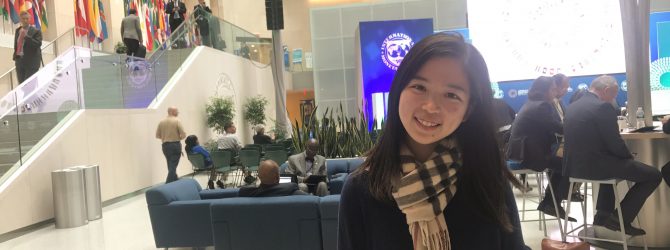Xiao Tan is a second-year CIPA student from China. She is concentrating her studies on Economic and Financial Policy. If you wish to learn more about Xiao, you may read her bio here.
Our CIPA Washington DC Externship Semester is a great opportunity for MPA students interested in working for federal governments, international organizations, or think tanks. DC is a political and intellectual hub, home to a wide variety of research institutions and multilateral organizations. I came to DC in June and completed a summer internship in the Foreign Policy Department of the Brookings Institution. I then started my fall externship at the World Bank in late August.
Typically, the externship semester is comprised of an externship experience, a colloquium course (offered in DC through CIPA), and an externship paper. Students are encouraged to take courses at the Center for Nonprofit Advancement or the Cornell in Washington Center. If they prefer, students can take additional coursework on the Ithaca campus in the semesters preceding or following the externship semester, in order to graduate with their class.
I chose to enroll in two courses offered at Cornell in Washington: Professor Seth Harris’ Leadership in Public Affairs class and Professor Steve Suranovic’s International Trade Theory and Policy class. Professor Harris’ class was a mixture of case studies and great guest speakers including the Democratic National Committee Chair Tom Perez, former Acting Administrator and Deputy Administrator of the Environmental Protection Agency Bob Perciasepe, Chief Operating Officer of CARE Heather Higginbottom, and former Chair of the U.S. Equal Employment Opportunity Commission Jenny Yang. I was also a big fan of Professor Suranovic and his trade models. In his class, he focused on real world applicability and regularly wove real-world policies into our discussions on trade models.
For my externship at the World Bank, I worked for the Development Impact Evaluation (DIME) arm of the Research Group of the World Bank. I had the opportunity there to participate in two impact evaluation (IE) teams. Generally, each DIME IE is led by an economist and is supported by a team of researchers, coordinators, research assistants, and support staff. My main responsibility was to perform high frequency data quality checks, data visualization, and data analysis. My final assignment was a report including graphs, analysis, and recommendations that would be submitted directly to the country government.
Over the semester, I also served as the chair of the CIPA Colloquium program in DC and worked as a graduate assistant for the Office of Academic Diversity Initiatives (OADI) remotely. As a colloquium chair, I served as a contact for speakers, introduced them at colloquium sessions, and coordinated the discussion. As a graduate assistant, I reviewed, monitored, and organized budget and expenditures for individual applicants at Cornell University. I also helped organize the annual Diversity in Scholarship & Engagement (DSE) Symposium event during which students presented their research.
The beginning of the semester was a bit challenging as I struggled to multitask my externship, my part-time jobs, my courses, and my personal life. However, thanks to guidance from my CIPA advisor Tom O’Toole and my supervisors at the Bank, I quickly learned to prioritize tasks and concentrate amid distractions to complete each task efficiently and effectively.
Each autumn, IMF and World Bank hold Annual Meetings. These are held in Washington, DC two years out of three, and are comprised of public events that are open to all levels of WBG employees. I attended many of these events, during which an array of world leaders expressed their opinions on important policy issues.
If you are interested in working at the World Bank after graduation, you would want to pursue an externship there during your last semester at CIPA. However, if you are not planning to work at the Bank, I suggest that pursue the Externship in DC during your third semester, so that you will come to have a better understanding of your strengths and weaknesses. This will allow you to return to the Ithaca campus for one additional semester, where you can work on your weaknesses.
D.C. is a fun and beautiful place to spend a semester, and I highly recommend the Washington Externship Semester.

